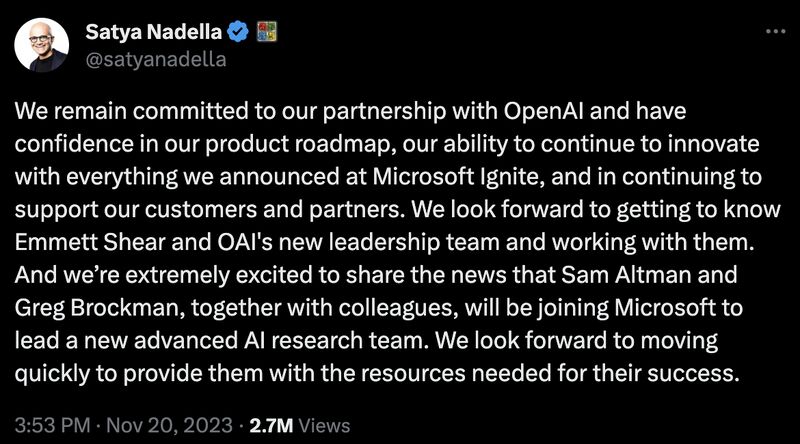https://edition.cnn.com/2023/11/19/tech/sam-altman-open-ai-firing-board/index.html
https://www.cnn.com/2023/11/18/tech/openai-sam-altman-shakeup-what-happened/index.html
https://edition.cnn.com/2023/11/20/tech/sam-altman-joins-microsoft/index.html

A company’s board of directors has an obligation, first and foremost, to its shareholders. OpenAI’s most important shareholder is Microsoft, the company that gave Altman & Co. $13 billion to help Bing, Office, Windows and Azure leapfrog Google and stay ahead of Amazon, IBM and other AI wannabes.
So a day later, the board reportedly asked for a mulligan and tried to woo Altman back. It was a shocking turn of events and an embarrassing self-own by a company that its widely regarded as the most promising producer of the most exciting new technology.
The board angered a powerful ally and could be forever changed because of the way it handled Altman’s ouster. It could end up with Altman back at the helm, a for-profit company on its nonprofit board – and a massive culture shift at OpenAI.
https://www.bbc.com/news/technology-67474879
But Microsoft, OpenAI’s biggest investor, has decided not to take a chance on Mr Altman taking this tech elsewhere. He will be joining the Seattle-based tech giant, it has been announced, to lead a yet-to-be-created AI research team. His co-founder Greg Brockman goes with him, and judging from the number of staff members posting on X today, it looks like he’ll be taking some of OpenAI’s top talent too.
Many OpenAI staff members are sharing the same post on X. It reads: “OpenAI is nothing without its people”.
Is that a warning to Mr Shear that he might have some hiring to do? A BBC colleague outside OpenAI’s headquarters just told me at 0930 in San Francisco, there were no signs of people arriving for work.
https://edition.cnn.com/2023/11/20/tech/openai-employees-quit-mira-murati-sam-altman/index.html
“Your actions have made it obvious that you are incapable of overseeing OpenAI,” wrote the employees. “We are unable to work for or with people that lack competence, judgement and care for our mission and employees.”
The employees also warned that they would “imminently” follow Altman to Microsoft unless the board resigns and reinstates Altman and Greg Brockman, the former OpenAI president who was also removed by the board on Friday.
Views : 127




